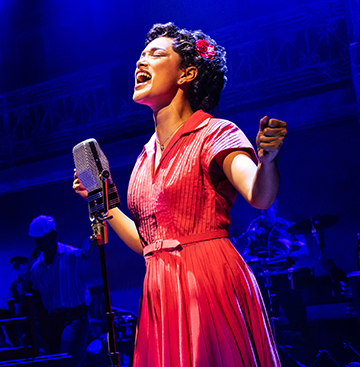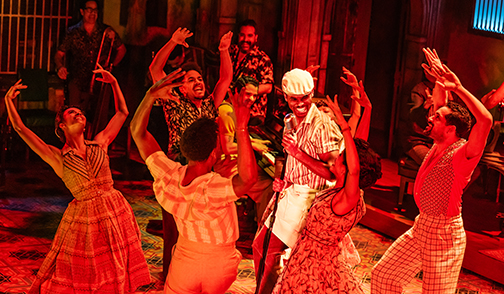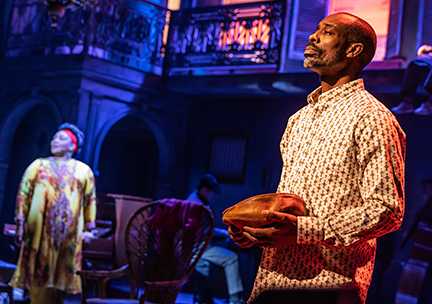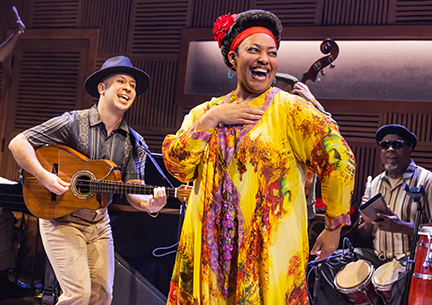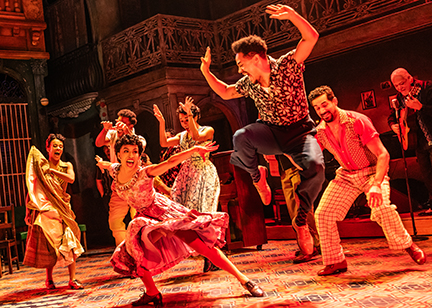By Lucy Komisar
“The Buena Vista Social Club” is about a Cuban band founded in 1996 made up of musicians that had played decades earlier, in the late 1950s, importantly on the cusp of the 1960 Cuban revolution. Their album released in 1997 became an international success. Some performed in the U.S. and Europe, and the band was the subject of a Wim Wenders documentary in 1999.
Marco Ramírez has taken the songs and written a story to tie them together, moving between the 90s and flashbacks to the 50s, though the people of the story are no longer alive.
A great Cuban singer Omara Portuando (Isa Antonetti, with a terrific belting voice) becomes famous in 1960 and will be a star for decades.
But at the 90s time of the play, Omara (now played by Natalie Venetia Belcon), hasn’t sung in six years, the result of sorrow at the death of her sister. A producer Juan de Marcos (Justin Cunningham) wants to make a record of her doing the songs of the past. She is reticent.
There are flashbacks to the late 50s. She and her sister Haydee (Ashley de la Rosa) are competing for a singing prize. She discovers a dive bar, the Buena Vista Social Club, one of many such clubs that catered to locals, not rich tourists. She meets a charming singer, Ibrahim Ferrer (Wesley Wray, a strong baritone), who is black. Cuban clubs were segregated, run by white and black societies. The Buenavista Social Club was a black society, based on fraternities organized by African slaves in the 19th century.
Omara and her sister appear at the Tropicana, a tourist spot. A talent scout from Capital Records in the U.S. wants to sign them. The revolution led by Fidel Castro that overthrew the U.S. supported dictator Batista is happening. Haydee says this is our way out.
The scout tells Omara what will happen, citing letters he has seen: “The time has come for unity. Cuba will no longer be divided by wealth or race.” He says, “Change is coming, but with it… opportunity.”
A failure of the play is to not make this more of that story. Why does Omara want to stay and her sister want to leave? To sing for Cubans against the chance to be famous? What about living in Cuba after the revolution or fleeing to the U.S.? Ibrahim, the black singer, has no choice, but we don’t know what he thought of the revolution that promised to end racism.
How can a story that takes place on the cusp of the upheaval that transformed Cuba not be addressed seriously? Is this a fearful response to America’s current limitations on political expression regarding the Deep State’s adversaries? (People are being seized and disappeared.)
Turns out Capital Records signed Haydee for the duo but really wanted Omara, so the sister who boarded the plane to the U.S. alone got dropped. A Cuban producer disses the company as Capital-ism Records! And signs Omara, who becomes a big hit in Cuba and then worldwide.
Omara of course does the show
The songs and realities they reflect are all in Spanish. For an American audience, director Saheem Ali should have made some English translations sung or projected. A program insert of translated songs can and should be read later, but that is too late. So, this show is probably terrific for Spanish speakers but misses an element for everyone else.
Think of this as an Hispanic music and dance performance. Choreography by Patricia Delgado and Justin Peck is culturally correct, like going back to the Tropicana for its Cuban music and folkloric dance. In fact, this belongs in Havana.
Alas, with the 65-year-old U.S. embargo making life miserable for the Cuban people, promoted by politicians (currently led by SecState Rubio) still fighting for the (pro-Batista?) regime change Omara would have opposed, this is as close as most Americans will get to it.
“Buena Vista Social Club.” Written by Marco Ramírez, directed by Saheem Ali. Schoenfeld Theatre, 236 West 45th St, NYC. Runtime 2hrs10min. Opened March 19, 2025.


